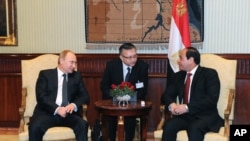Russia and Egypt signed several agreements to reinforce military and economic ties, along with a deal to help Cairo develop nuclear power capabilities. The agreements capped a two-day visit by Russian President Vladimir Putin.
The audience applauds Putin and Egyptian President Abdel Fattah el-Sissi as they agree to strengthen mutual ties in the face of a growing terrorist threat and outside economic pressures.
At a news conference Tuesday, the two leaders also announced a nuclear deal to help Egypt develop its power capabilities.
Putin said both sides had agreed to intensify cooperation in various areas, including Russian investments in Egypt, tourism, and cooperation in the battle against terrorism.
He says he and Sissi discussed in detail the regional and international situation and agreed to increase mutual efforts in fighting terrorism. He stressed the need to resolve both the Syrian and regional Middle East conflicts was imperative.
Putin said Russia had shared details of recent Syria peace talks in Moscow and he and Sissi would like to see a peaceful resolution to the four-year-old conflict.
Mark Katz, Professor of Government and International Affairs at George Mason University, said Putin wanted to show that Russia continued to be involved in the Middle East. "So the visit is meant to make a positive statement about Russian-Egyptian relations,” he said .
Without giving specific details, Sissi said the battle the Egyptian Army is waging against Islamist militants in the Sinai and elsewhere created an urgent need for Egypt to increase military cooperation with Russia.
Russia "can’t offer all that much (to Egypt), said Katz. "Obviously there was the arms package the Russians have offered and the Saudis have indicated in the past that they will pay for it, but now they can’t, so it seems that the deal is not going well."
Katz says that Egyptian officers believe they don’t see Russia as an alternative to the U.S.
"They would much rather continue to deal with the U.S. and while the U.S. is not happy with the way Sissi came to power or the way he ruled, the U.S. has very little choice but to work with him,” he said.
But many observers were caught by surprise by Sissi's announcement that Egypt and Russia had signed a nuclear power agreement.
He says both parties have agreed to strengthen cooperation regarding various sorts of power, including peaceful nuclear generation due to Russia's long experience in this field and Egypt's need to develop its power capabilities.
Egypt ended its nuclear power program in the 1980s, following the nuclear disaster at Chernobyl in Ukraine. Former President Hosni Mubarak announced a resumption of Egypt's nuclear program in 2006.
Mohamed Elshinnawy contributed to this report from Washington

